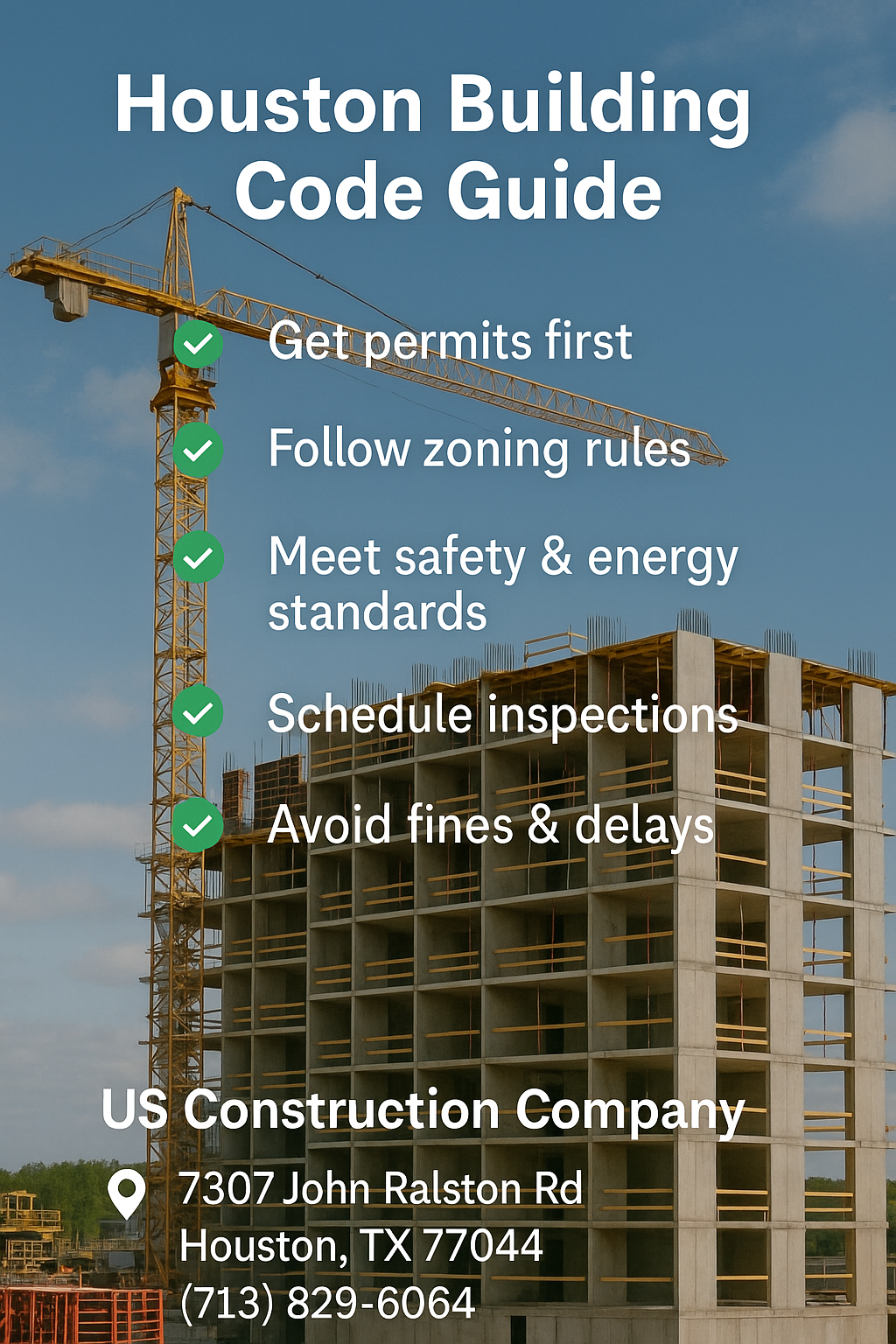Knowing the Houston, Texas, construction code can help avoid planning and permitting problems. Overcoming these obstacles will allow you to finish your work on schedule and save money. This brief guide to the Houston building code for homeowners protects you from future inconveniences.
Don’t be afraid to handle the legalities of home construction. Contact US Construction Company for professional assistance and project management. Building code conformity is necessary whether you’ve decided on a bit of home remodelling or a major construction. We protect your investment and the safety of your family.
When Do You Need a Permit?
The property owner required more time and money to prepare and document the permitting process. You might wonder if you actually need a permit for some minor projects. For your understanding, we explain the most frequent types of construction requiring permits:
- Remodelling Projects: Permits are needed for any renovation beyond simple adjustments, such as coloring walls or placing wallpaper.
- Construction on a New or Existing Building: Approvals are mandatory for any new home, business structures, or remodelling.
- Repairs: Permission is usually needed for restorations to address problems with the structure. Indeed, in structural renovations, professionals need major replacements. Thus, hiring the best Houston residential contractors is the optimal choice.

Which Residential Codes Apply in Houston?
Model Houston Codes (with local amendments)
Houston local inhabitants employ the following standard codes:
- 2021 Uniform Plumbing & Mechanical Codes
- 2023 National Electrical Code (NEC),
- 2021 International Codes (IRC, IBC, IECC, etc.)
In January 2024, the Houston City Council passed significant amendments to its construction safety and conformity codes. The users and experts can access these documents on their official websites. ICCiapmo.org is the primary authority to publish codes that the Houston Permitting Center regulates.
No Traditional Zoning
Absence of conventional structuring in Houston lacks a municipal ordinance; its officials execute Chapter 42 construction regulations, which regulate:
- Construction boundaries (the distance between buildings), lot dimensions and width, and permitting.
It explains that your design and contract restrictions still govern the plans close to your land’s borders.
Floodplain Rules
Chapter 19 of the Houston Code includes leveling and protection standards (post-Harvey) if your property is in a 100-year or 500-year flooding zone.
Additional elevation requirements apply to new residences in recorded floodplains; these requirements are frequently to or exceeding the 500-year (0.2%) storm table plus freedom of movement. Verify your address in advance to plan further.
Site and Structural Basics Codes
Wind Speed and Building
Houston residences must withstand winds from the Gulf Coast.
- The standards for garage doors, uplift connections, insulation, and anchoring are outlined in the IRC/ASCE 7 wind loading layout charts (or verified design).
- Verify the wind characteristics at your location using the ASCE Hazard Tool or a local designer.
During proposal review and framework checks, look for acceptable roofing schedules, anchorages or buckles, and wall-to-wall links. (The one-family home criteria in Houston directs you to the precise information that inspectors look for.)
Floodplain
Chapter 19 regulates substructure and leveling, waterproofing components below the specified flood slope, and drainage (if required) in recorded flood areas. Plan because last-minute adjustments are expensive.
Coastal Windstorm Certification
The Texas Department of Insurance (TDI) has designated certain regions of the Houston metropolitan area as typhoon regions. Substantial work requires TDI verification or inspection (WPI-8) for weather protection if the building you own is located within a specified catastrophe region. Have your developer or Houston general contractor look it over.
Fire and Life Safety Codes
Smoke Alarm System
When developing new structures, contractors must conduct hardwired installations powered by batteries. These installations should be attached to each dwelling, external sitting space, and floor. Houston’s auditor assessment mentions this explicitly.
Carbon Monoxide Detectors
In accordance with IRC R315 regulations, they must be placed on the entire level and on the exterior of sleeping areas in homes with gasoline-powered facilities or a separate garage.
Garage/Fire Separations
The walls and ceilings between the garage and the house must have automatically closing, robust, or flame-resistant doors and gypsum-rated drywall. Moreover, sleeping rooms should have ample ventilation. IRC R302.5 and municipal checklists are the sources of this.
Exits, Stairs, and Egress Windows Rules
Stairs
There should be a convenient railing, regular ramps, stairs, a maximum 7-3/4 in riser, and a minimum 10 in step (Houston specifies up to 10-1/2 in standard). Where pathways are ≥30 inches above the ground, protectors are required.
Emergency Egress Windows
Minimum precise doorway dimensions are 5.7 square feet (or 5.0 square feet at base floor), 20 inches in width, 24 inches in length, and sill ≤44 inches higher than floor. If these are not accessible, we can’t reduce them with optional bars or screens.
Doors and Hallways
The planning supervisor will verify specifications per IRC Chapter 3. Ensure the front exit doors and corridor widths permit safe evacuation. Avoid crossings and staircases that pose a trip threat.
Electrical Connections Code (2023 NEC in Houston)
Most electricity improvements demand certifications or assessments. Houston implements local adjustments to the 2023 NEC.
GFCI/AFCI Protection
Consider your electrical technician’s circuitry schedule, which indicates that most residential areas require AFCI. However, cooking areas, baths, launderettes, basements, and outdoor spaces require GFCI. Houston’s inventory highlighted these categories during the examination.
Service Disconnect and Panel Clearance
According to NEC 110.26, new single- and two-family homes usually require an exterior escape separation, and displays must have unobstructed working space. Inspectors measure these credentials.
Tamper-Resistant Receptacles
Regular NEC inspections, preliminary and final, include reliable circuit connections and grounding. These codes are essential for small kitchen appliances and dedicated bathroom circuits.
Energy and Comfort (2021 IECC with Houston amendments)
Professional Houston residential contractors are aware of the recent amendments in Houston building codes and follow them strictly. These legislative frameworks improve the construction’s structural integrity and the on-site workers’ well-being.
Air Leakage (blower door test)
All regulatory options in CZ 2 (Houston) permit a maximum of 5.0 ACH50. Verification is required; prepare an official examination report and enclosure parameters.
Insulation Levels (prescriptive path)
The 2021 IECC has increased the standard loft insulation value for Tropical Zone 2A to approximately R-49; the same is true for ceiling, floor, and window U-factor/SHGC objectives. Plans investigators use the regional IECC amending tables that the Houston city department provides.
Ducts and Ventilation
Auditing for duct leaks is necessary. Cooking exhaust hoods and toilet ventilation must vent externally rather than into rooftops. Dryer ducts have size and material restrictions.
Houston-Specific Energy Notes
The city issues newsletters on the 2021 IECC regulation (e.g., massive-home electricity monitoring, and R404 lighting and control procedures). Request that the contractor or designer adhere to the most recent Municipality conservation handouts.
Houston’s acceptance of the 2021 IECC is more stringent than Texas’s previous provincial baseline design.
Mechanical and HVAC Systems Regulations
Sizing by Calculation
ACCA Instructions J must be used to size fresh or replacement systems (including ductwork per Instruction D). Overweight programs function inadequately and fail plan reviews.
Combustion Venting
According to the supplier and regulations, gas-powered appliances must have adequate airflow for combustion and exhaust release to the outside. Venting hoods have limitations, and kitchen exhaust tops must be blown outward when necessary.
Attic Equipment Access
Surveyors search for a door aperture, an illuminated box, a sturdy pathway, and a support platform that are all the proper size if the gadgetry is in the basement.
Plumbing and Gas Connections (2021 Uniform codes)
Water Heaters
Water heating units must have pressure and temperature (T&P) relief outlets and appropriately sized discharge pipes that terminate in a clearly approved location; their drain lines cannot have valves. Anticipate that inspectors will examine burning air and pan drainage for combustion units.
Scald Protection
Specific temperature mixing is necessary for showers and tubs to avoid scalds, which is a regular fix when appliances are switched.
Gas Piping
The Uniform Mechanical/Fuel Gas regulations that Houston implemented include routine testing for pressure, authorized staff, shutdown points, and sediment barriers at appliances.
Rooms and Livability (IRC “habitable” Standards)
Ceiling Heights, Light, and Ventilation
Bedrooms and living areas require the required ceiling level and open airflow. They also require perforated openings, appropriate smoke and CO alerts, AF/GF shielding, and compatible power lines.
Fire-resistance of exterior walls and constraints on windows and openings are more stringent. Windows may be regulated, and your frame structure and siding may require grades if you are directly on an adjacent building line.
Practical Step: The Residential Contractors Take
- Verify your residence site (including floodplain, map, or structure lines).
- Design per Houston’s approved codes (2021 Uniform Codes, 2023 NEC, and I-Codes/IECC).
- Include compliance remarks in your permit summary.
- Arrange the groundwork → initials → energy efficiency → closing inspections.
- Before every audit, walk through the Houston auditor document that is kept on hand.
Best Houston Residential Contractor Near Me
In fact, conformity to Houston building codes is extremely difficult for a property owner to manage and document individually. Importantly, on-site audit clearance and challenging structural requirements always require professional assistance.
This is where Houston residential contractor experience comes in; we manage the intricate permitting procedure to ensure your home improvement project proceeds without legal complications.
FAQs
Q 1. Do Houston house improvements always require a permit?
Not all the time. Permits are not required for minor home renovations like repainting the exterior walls, changing the wallpaper, or refinishing the floor tiles. However, remodeling activities that interact with the pillar walls that carry the building load need approval. Likewise, changing the plumbing connections and electrical rewiring requires certifications from municipal authorities.
Q.2. What are the advantages of hiring a qualified Houston residential contractor for managing permits?
Indeed, the property owner can submit applications for a permit reward and follow the process. But this is a legal procedure that requires expertise in each aspect, so most people find it hard to complete. Moreover, a single moment of negligence can cause penalties and work holdbacks. So, it is recommended that you hire US Construction Company, a reliable residential contractor in Houston, Texas.


Leave A Comment